|
Compost
|
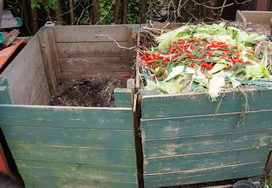
What Do I Need? Some sort of container that will allow some air into the process yet allows it to build and retain some of the heat that the process creates and needs. There are a lot of commercial devices available and most of them work well. Mine is simply a large wooden bin with a black plastic lid. I have two of them side by side. Fresh material is dumped into one over the course of a year and the other contains the finished product produced the previous year.
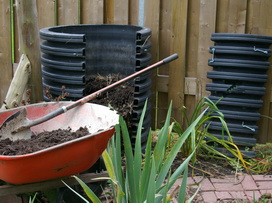 In the back of the garden I have another made from a section of plastic sewer pipe. I cut a section out of it with a chain saw and then hold it back in place with some hooks and eyes. This makes it easy to empty. You can be absolutely creative about constructing your own bins if you choose not to purchase one.
In the back of the garden I have another made from a section of plastic sewer pipe. I cut a section out of it with a chain saw and then hold it back in place with some hooks and eyes. This makes it easy to empty. You can be absolutely creative about constructing your own bins if you choose not to purchase one.
What Goes Into It? Almost all excess and finished plant material. I keep a small plastic pail in the kitchen that receives the ends, bits and scraps of the vegetables that I am preparing for meals. That pail gets emptied into the large outdoor bin when it becomes full. All through the gardening season, the weeds, the finished vegetable plants and the prunings and trimmings from almost all of the garden go into the bin. I take a few minutes as I gather this material to chop it up into relatively small pieces to hasten the process.
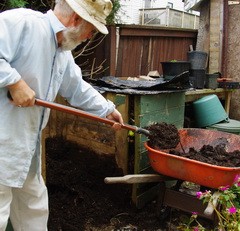
What Stays Out? All of the material that I put out for the municipal program could go in my bin and eventually become compost but there are a variety of things that I choose not to use. Rose bush prunings decompose slowly and the thorns hardly at all. I don’t like getting them stuck in my hands when I’m using the finished product in the garden. Heavy sticks and twigs that break off my large trees or that I prune from them. I’m just too lazy to wait for them to break down and I have not yet been able to justify purchasing the power shredder that would speed up the process. If I’m dealing with a particularly nasty disease on some plant or other I will keep it out of my bins just in case the composting process does not kill the pathogen. The leaves from my Walnut tree carry some juglone, a chemical that inhibits the growth of many plants and they go to the curb in brown bags along with the walnuts.
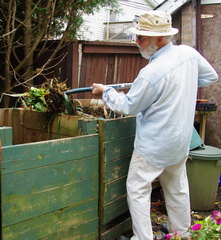 How Much Work? You have to get rid off all of your vegetative waste somehow and tossing it into the compost bin is actually easier than trying to bag it for curbside collection. The extra bin under the kitchen sink just reduces the amount of garbage that you have to carry out. The hardest bit of work, in my simple system, occurs in the early fall. The finished compost bin is empty and I take all of the contents of the active bin and turn them over into the empty bin. This process is less than an hour of physical effort and it speeds the process as well as breaking up any clumps of material that were resisting. I have tried adding commercial compost accelerators but have found little if any difference. This two bin process leaves me with a bin full of useable compost and an empty bin into which I can dump new stuff over the course of the year.
How Much Work? You have to get rid off all of your vegetative waste somehow and tossing it into the compost bin is actually easier than trying to bag it for curbside collection. The extra bin under the kitchen sink just reduces the amount of garbage that you have to carry out. The hardest bit of work, in my simple system, occurs in the early fall. The finished compost bin is empty and I take all of the contents of the active bin and turn them over into the empty bin. This process is less than an hour of physical effort and it speeds the process as well as breaking up any clumps of material that were resisting. I have tried adding commercial compost accelerators but have found little if any difference. This two bin process leaves me with a bin full of useable compost and an empty bin into which I can dump new stuff over the course of the year.
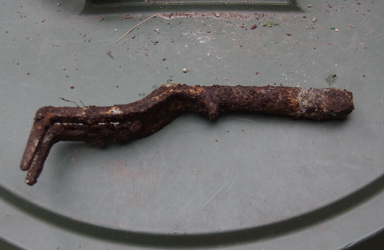
A tiny bit of extra effort and a bit of construction yields hundreds of dollars worth of the richest organic soil amendment from material that you might otherwise throw away. Occasionally you find a long lost tool buried in the bin.
You can search my entire site for answers to your gardening questions.
